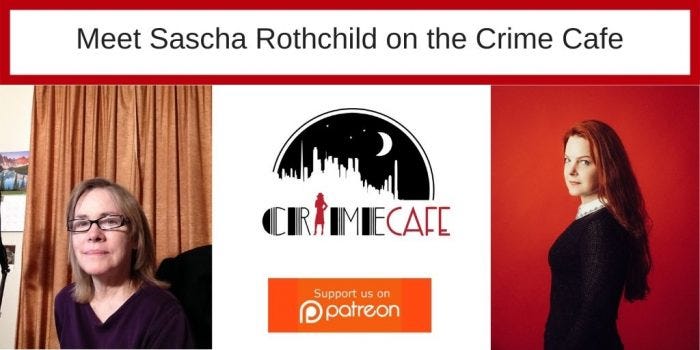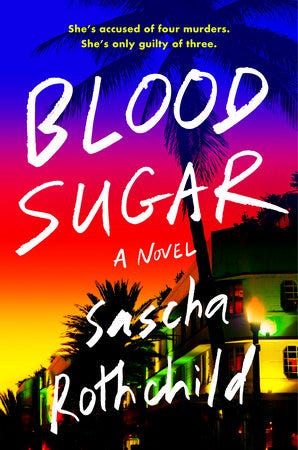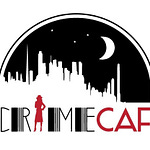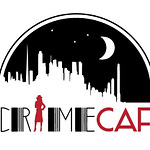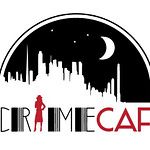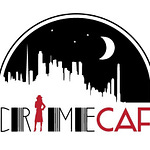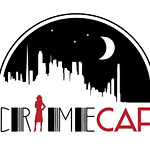Subscribe: Apple Podcasts | Google Podcasts | Spotify | Stitcher | Blubrry | Email | TuneIn | RSS | More
This episode of the Crime Cafe podcast features my interview with crime writer, screenwriter, and producer Sascha Rothchild.
Check out our discussion of her debut novel Blood Sugar! And a bit of chat about screenwriting.
This is the Crime Cafe, your podcasting source of great crime, suspense and thriller writing. I’m your host Debbi Mack. Before I bring on my guest, I’ll just remind you that the Crime Cafe has two eBooks for sale: the nine book box set and the short story anthology. You can find the buy inks for both on my website, debbimack.com under the Crime Cafe link. You can also get a free copy of either book if you become a Patreon supporter. You’ll get that and much more if you support the podcast on Patreon, along with our eternal gratitude for doing so.
Check us out on Patreon: https://www.patreon.com/crimecafe
Debbi (00:54): But first, let me put in a good word for Blubrry podcasting.
I’m a Blubrry affiliate, but that’s not the only reason I’m telling you this. I’ve been using Blubrry Podcasting as my hosting service for my podcast for years and it’s one of the best decisions I ever made. They give great customer service, you’re in complete control of your own podcast, you can run it from your own website, and it just takes a lot of the work out of podcasting for me. I find for that reason that it’s a company that I can get behind 100% and say, “You should try this.” Try Blubrry. It doesn’t require a long-term contract, and it’s just a great company, period. It also has free technical support by email, video, and phone, so you can get a human being there. Isn’t that nice?
If you want to podcast, try out Blubrry. No long-term contract, excellent distribution, and great technical support, too, by email, video, and on the phone. I’ve included an affiliate link on this blog.
Here’s a PDF transcript of the interview!
Debbi: Hi everyone. Our guest on the final episode of Season 7 of the Crime Cafe is an Emmy-nominated screenwriter who just released her debut novel, Blood Sugar and I have a copy right here and check out that cover!
If you’re watching on YouTube, I tell you that is a beautiful cover. Her credentials include working on the public radio show This American Life, writing a memoir-turned-screenplay called How to Get Divorced by 30, writing and producing various television shows—GLOW, The Bold Type, The Baby-Sitters Club and The Carrie Diaries, to name a few. And she’s now a showrunner for a Netflix series. Her feature film screenplay Who Invited Her? has been optioned by DreamWorks with Reese Witherspoon to executive produce it. Not too shabby, as they say.
It’s with great pleasure that I introduce my guest Sascha Rothchild. I hope I said that right.
Sascha: Yes. It’s a mouthful. Sascha Rothchild. I know my parents had fun with that one.
Debbi: Well, very cool. I just want to thank you for being here, spending time with us first of all. I could ask you 10,000 questions based on your background, but we’ll start with the book anyway. What prompted you to write a novel?
Sascha: I had an idea late at night that started with a personal event. My husband is a Type 1 Diabetic, and he had a low blood sugar at night, which is quite dangerous. He has a continuous glucose monitor and it beeps very loudly to wake him up so he can eat sugar and he had a low blood sugar. There was the beeping. I woke up, I woke him up, he ate sugar, he’s safe and healthy, and he fell right back to sleep. But I was wide awake and my writer brain started turning and asking, well, what if and what if?
And I thought, well, what if he had died? Well, that would be horrible. But then I moved on to story and plot and I thought, what if the police thought I killed him because the spouse is always the first suspect? And then I thought, wait! What if I actually had murdered people in my past and gotten away with it. Now I’m being investigated for the one murder I didn’t commit. And I thought this is a novel. This is a thriller. I had never written a thriller before, but it just clicked for me, and I grabbed my cell phone and I made notes in the notes section so when I woke up the next morning it would be there. And I woke up and I looked at my notes and I started writing.
And I thought, well, what if he had died? Well, that would be horrible. But then I moved on to story and plot and I thought, what if the police thought I killed him because the spouse is always the first suspect? And then I thought, wait! What if I actually had murdered people in my past and gotten away with it.
Debbi: Wow! Well, that’s very, very interesting. And I have to ask, this is the first novel you’ve written, correct?
Sascha: Yes.
Debbi: And congratulations by the way on debuting with your novel. That’s awesome.
Sascha: Thank you.
Debbi: Screenwriting and novel writing are two very different things. They’re similar in certain ways, but they’re very, very different in others. What was it like for you to switch gears from screenwriting to novel writing?
Sascha: It was very different. In one way, it’s very solitary to sit and write a novel. You’re alone with your computer and you’re building this world by yourself. Screenwriting for television, there’s writer’s rooms. There’s many voices that are added. There was something really exciting for me to just be alone with this world, with this idea and another difference, which I think I ended up sort of pulling some of my screenwriting into the novel was in screenwriting, every word costs money. So if you write a character walks down a windy street, you have to pay for the wind. There has to be a wind machine and somebody wrestling a tree and the hair people have to fix the windy hair, so every detail has to be important to story or character or else it’s a waste of money. With a novel, the words are free. You can write whatever you want. So I really opened myself up to writing in that way, but I kept in mind when things were important and why, so that every detail actually did come back and actually did relate to story. I tried not to have tangents that weren’t serving the main plot and character. So in that way, they were very different, but I pulled in my screenwriting for the novel.
It was very different. In one way, it’s very solitary to sit and write a novel. You’re alone with your computer and you’re building this world by yourself. Screenwriting for television, there’s writer’s rooms. There’s many voices that are added.
Debbi: I think in many ways, learning screenwriting can really help novelists from so many perspectives. I mean, not just the idea of keeping the story moving forward and not going off on too many tangents, but also the conciseness, the use of words to evoke a feeling, things like that.
Sascha: Yeah, I think it was really exciting for me because as I wrote it, I really could see it. I could see the scenes, and I wrote the chapters. They’re very short chapters, like scenes in a show and the cliffhangers are very much like episode endings. My hope was in the way that when I write for Netflix series, you want to sort of have people binge it and click next episode and click next episode that I hope that this novel, it was sort of binge reading in the sense that the reader would want to go to the next chapter and the next chapter, and then stay up and finish it and it’s four in the morning.
Debbi: Well, I can tell you from just from reading it that it does. It is. It’s that kind of reading and I love short chapters like that. They work very well, and all of it is so very much informed by screenwriting and it’s great. One of the interesting aspects about all this is that here’s a woman. She’s being tried for a murder she didn’t commit, yet she’s committed these other murders, and at one point since she’s kind of an unreliable protagonist, did you ever consider that she might just be lying?
Sascha: I felt getting into her head that she was telling us the truth. Now, when she told us the truth was a question of when she’s dropping certain things, but that she’s being honest with the reader and letting the reader know this is who I am. This is what I’ve done. I am telling you the real story. And I think it will be up to the reader to decide, can they trust her throughout? At what point do they trust her or do they never trust her? But I, as I wrote it, trusted her.
Debbi: Yeah. Yeah. That’s, that’s a good way of putting it, because really for the reader, there is an ambiguity, or you can find an ambiguity if you’re looking for it.
Sascha: Yeah.
Debbi: But as a writer, I like that you believed her as a protagonist because that makes her more real as a person. I thought the book dealt really well with issues like trying cases in the press, so to speak, or these days in social media and the press, because this is kind of a problem. I mean, we are supposed to be presumed innocent until proven beyond a reasonable doubt that we are guilty. And so I thought that issue, was that something that kind of informed the novel as well?
Sascha: It did. Well, one thing I thought a lot about is when crime and true crime becomes entertainment and the lawyers become the peacocks and it no longer is about the crime, but about the characters around it. It really, one, raises stakes in terms of storytelling because now you’ve got cities involved or countries watching. So I was very interested in that, but also in that public perception is very much a part of our justice system now and what can be done about that? I don’t know, but I thought it was an interesting thing for story for sure.
Well, one thing I thought a lot about is when crime and true crime becomes entertainment and the lawyers become the peacocks and it no longer is about the crime, but about the characters around it.
Debbi: It definitely creates a lot of tension. Do you plan on writing any more books?
Sascha: I do. I really had a wonderful experience with this and I have a few ideas up my sleeve, and I think interestingly, my brain for novels, I love sort of this crime genre and sort of a psychological thriller. And that’s where my other ideas are leading me, which is very different from my television work, which is usually comedy. So, I’m able to just kind of explore two very different parts of myself.
Debbi: That’s cool. Very cool. What has the publishing process been like for you?
Sascha: It has been delightful. I worked on this for a few years whenever I had time and then I felt it was ready and we sent it to book agents and I signed with a wonderful agent who just got it and believed in it. Some agents didn’t get it and I was like, okay, then you’re not the right fit for me. And then my agent sent it out and within a week, we got offers and I interviewed editors and I thought a wonderful litmus test for this is the first chapter. It’s quite shocking and it really is polarizing, and I think that’s exciting. I think people will love it or hate it. It will generate debate. The editors who love that first chapter and thought we are in, I thought, okay, this is the person for me versus the editor who thought we love the world, but maybe the first chapter’s a little much. So it was a very good way to sort of find people to help me bring out the best in it without changing its essence. Working with my one editor was fantastic. And then, there’s cover art and there’s press, and then the book exists in the world. So it’s been a really wonderful experience.
Debbi: That’s fantastic. It’s good to hear a story like that. About publishing. Did you do a lot of research before you wrote the book?
Sascha: I did. I did a lot of research about certain laws and certain Grand Juries, and I spoke to a lot of attorneys to try and keep this in the realm of believability. I’m sure there will be lawyers who read it and say, well, that’s not exactly correct. I think I’m okay with that because it is a novel and it’s fun, but I did do quite a bit of legal research. I also did research on psychiatrists and psychologists and I myself have been in therapy for so long so a lot of that was my own personal knowledge of sitting on that couch, but I looked into sort of what is the real training for a psychologist? How does that work? And so those two professions I did research on to try and get those correctly.
Debbi: What kind of writing schedule do you keep?
Sascha: I’m very regimented. When I’m working on a TV show, obviously things are a little different. When we’re in production, I’m on set for 12 hours a day. But when I have a writing day, I wake up around 6:00 AM. I have coffee, I walk the dogs, I do yoga and I’m sitting at my desk by 8:00 AM and that’s the start of my day. And I sit and I stare, or I type until lunch, and then I take an hour for lunch and then I’m back from 1:00 PM until 5, and that’s it. I think sometimes the creativity flows and sometimes it doesn’t, but for me, I have to sit there because if you only sit there when you feel inspired, then you might never write anything.
I think sometimes the creativity flows and sometimes it doesn’t, but for me, I have to sit there because if you only sit there when you feel inspired, then you might never write anything.
Debbi: It’s absolutely true, for sure. Do you do a lot of marketing?
Sascha: I don’t know. I’m on Instagram and Twitter. Is that marketing?
Debbi: You know, that’s a very good question. I’m always asking myself exactly what is marketing, anyway?
Sascha: I mean, it’s marketing. I think that is a good question. I think with television stuff, it’s always marketed by Netflix. Netflix does plenty of marketing and so I sort of get brought along with that. This is really one of my first experiences with a novel. So I guess I’m not sure is the answer. We’ll see. We’ll see what happens.
Debbi: Perhaps you’re taking your first steps right now.
Sascha: Yes.
Debbi: This is interesting. Okay. What books do you like to read? What writers most inspire you?
Sascha: Most recently, the book that absolutely inspired me and changed me is Circe by Madeline Miller. Her taking this evil, lesser known Greek goddess who had been dragged through the mud for centuries and recreating her through her perspective so we understand why she did the thing she did, and that she’s just this incredible well-rounded goddess who has had all these bad things thrown her way and then men get to sing the songs and tell the tales. I was so amazed by that novel. And obviously it’s Greek mythology, but the historical accuracy within Greek mythology was beautiful, and just to delve into a anti-heroine in that way. It inspired me to keep working on Blood Sugar, actually.
Debbi: Actually, I was going to say it seems like anti-heroines are really a thing now.
Sascha: I think women now are allowed to be flawed and it was all men sort of famous. You know, the Dexters and the Walter Whites and the Tony Sopranos. We could love them, even though they were bad and we had a double standard with women. I think in the past 10 years, that’s changed quite a bit.
Debbi: Absolutely. What advice would you give to someone who’d like to do what you are doing?
Sascha: Well, I think if it’s somebody who wants to be in the television world, my first advice is move to LA or New York, or a city with a lot of television production. I think it really is important to be where television is made. If it’s someone who wants to write articles and novels and hone their voice, sitting down and actually writing is what you have to do. I think lots of people have a great idea. Every time I’m on an airplane, someone sits next to me and says, oh, I’ve got an idea for a screenplay or a novel, but unless you sit down and write it, you’re not a writer. So you’ve got to just sit down and stare at the screen. It can be daunting, but that’s the way. You just push through and then you’re writing all of a sudden.
Every time I’m on an airplane, someone sits next to me and says, oh, I’ve got an idea for a screenplay or a novel, but unless you sit down and write it, you’re not a writer.
Debbi: That’s right. That’s it. You just have to sit down and do it. I find that it’s been very helpful for me to read other people’s screenplays. Would you also recommend that?
Sascha: I think certainly reading screenplays to know the sort of format and structure will help. There’s a great screenplay writing book called Save the Cat, which I think is one of the best books. It’s very simple and it just really makes it sort of like you can wrap your head around how to write a movie and feel I can do this.
Debbi: Absolutely. That is one of the books I always recommend to people. That and Dave Trottier’s book about formatting.
Sascha: I think writing is sort of like cardio in the sense that if you’re out of shape, if you jog for five minutes, you’re exhausted. But then if you go six minutes and seven minutes and eight minutes, you can build up your strength and it’s similar to sitting down to write.
Debbi: Absolutely. For sure. And there is something about screenwriting. I think that you build momentum as you go. It almost feels like a very active sort of writing. That’s the way it feels to me. Is that the way you feel when you are screenwriting?
Sascha: Yes. I think you have sort of your view. Well, one, when I think about the word count of a novel, novels are long. I mean, this is probably like five screenplays, five movies. But I think as you write a screenplay and you are on this journey of the character and where we start, and then the act one sort of everything is a mess. Everything changes and then we’re into Act 2. You do feel this movement of story.
Debbi: Yes. That’s cool. Is there anything else you’d like to share with us before we finish up?
Sascha: I would love many readers to read Blood Sugar and to debate it and to think Ruby Simon is someone that I can relate to, I could be friends with, I really like, or she’s despicable and I can’t stand her, but I was very curious about what happens. I think for me, and when I’ve been in book clubs, the most fun book clubs are when we don’t agree about the book. I’m okay with not everyone loving Blood Sugar or loving Ruby Simon, but I would love it if it started some debates and some conversations about morality and guilt and what women are allowed to get away with. And I would feel very much like I’ve accomplished something.
Debbi: Well, I have to say that is a great thing to aspire to. Wonderful stuff. Thank you so much.
Sascha: Thank you so much. It was lovely talking to you.
Debbi: Same here. It was great. I had a great time talking to you. And to all my listeners, this is the final episode of the season, as I said. I’ll be on hiatus. However, if you become a Patreon supporter at the $10 level, you’ll have access to bonus episodes and audio chapters from my second Sam McRae novel, Least Wanted. So check us out on Patreon. In the meantime, I look forward to starting a new season this July. Until then, take care, stay safe and happy reading.
*****
Get in on the action! Become a Patreon supporter! 🙂





